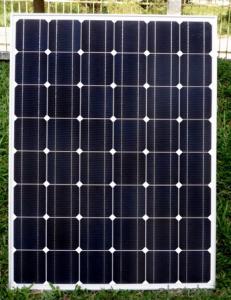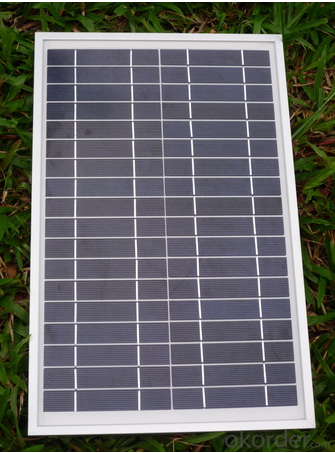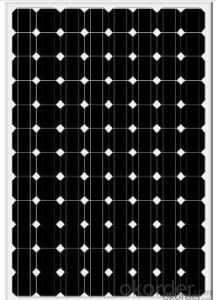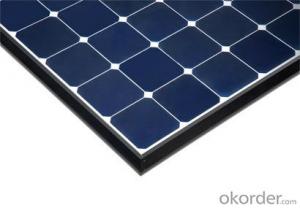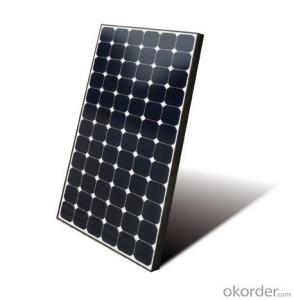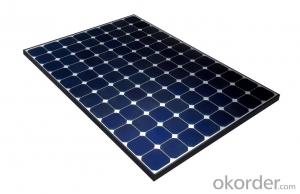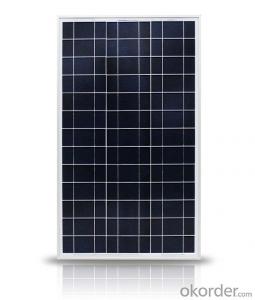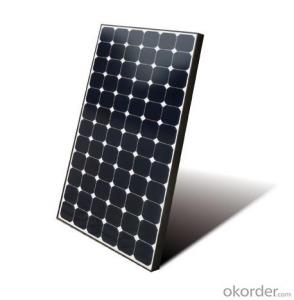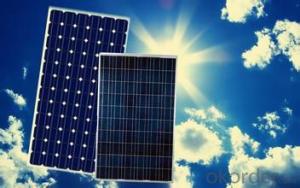Highest Output Solar Panels - Mono Solar Panel 260W A Grade with Cheapest Price
- Loading Port:
- Shanghai
- Payment Terms:
- TT OR LC
- Min Order Qty:
- 50 watt
- Supply Capability:
- 50000 watt/month
OKorder Service Pledge
OKorder Financial Service
You Might Also Like
Specification
Mono Solar Panel 260W A Grade with Cheapest Price
Product description
60 cell multi-crystalline solar module. 40mm natural anodised frame. IP65 rated Jbox, 1m solar cable and a pair of MC4 connectors.TÜV SÜD,SABS ISO 9001:2008 certified.
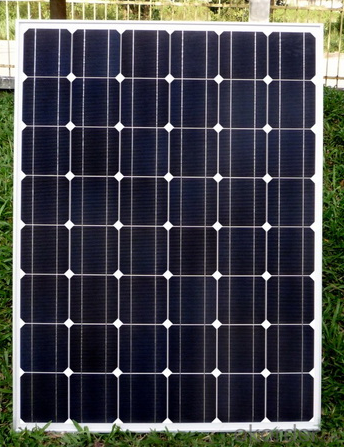
Application
Industrial
Commercial
Residential
Product feather
solar panel refers to a panel designed to absorb the sun's rays as a source of energy for generating electricity or heating.
A photovoltaic (in short PV) module is a packaged, connected assembly of typically 6×10 solar cells. Solar Photovoltaic panels constitute the solar array of a photovoltaic system that generates and supplies solar electricityin commercial and residential applications. Each module is rated by its DC output power under standard test conditions, and typically ranges from 100 to 365 watts. The efficiency of a module determines the area of a module given the same rated output – an 8% efficient 230 watt module will have twice the area of a 16% efficient 230 watt module. There are a few solar panels available that are exceeding 19% efficiency. A single solar module can produce only a limited amount of power; most installations contain multiple modules. A photovoltaic system typically includes a panel or an array of solar modules, a solar inverter, and sometimes a battery and/or solar tracker and interconnection wiring.
Packaging
24-26pcs into carton 312pcs for 20 foot container 712pcs for 40 foot container.
- Q: in a solar panel, i know that the electrons are knocked loose and used as energy, what happens to the protons?
- silicon based photovoltaic cells used some boron as dopant. i dont understand if that helps supress proton pastime, the way they be conscious boron on supressing run away nuclear reaction.... im clueless as you
- Q: Can solar panels be used in areas with high levels of wildlife activity?
- Yes, solar panels can be used in areas with high levels of wildlife activity. However, it is important to take certain precautions to minimize potential impacts on wildlife. This can include implementing proper installation techniques, such as avoiding nesting sites or wildlife corridors, and using deterrents to prevent wildlife from damaging the panels. Additionally, incorporating habitat-friendly designs and partnering with local conservation organizations can help mitigate any potential negative effects on wildlife populations.
- Q: Can solar panels be installed on a pergola or shade structure?
- Yes, solar panels can be installed on a pergola or shade structure. However, it is important to ensure that the structure is sturdy enough to support the weight of the panels and that they are properly angled to receive maximum sunlight. Additionally, the design and installation should be done by professionals to ensure safety and optimal performance.
- Q: How can I start working as a solar panel installer/technician without years of education?
- The best suggestion I can give is to call solar installation companies in your area, and ask for their recommendation as to what to do. They may recommend a technical college with an appropriate program. With unemployment rising, new jobs in solar will likely be scarce for a while. You might also inquire at roofing companies. If you apply at a solar company, and can demonstrate that you already have roofing experience, that will be a plus.
- Q: For my exam in science we are required to make a power point explaining why it would be good for our school to switch to solar. our complete handout given to us by our teacher is as follows:Power Point to include:. What you propose for alternative energy usea. Any thoughts on energy conservation...2. Why this is a good idea3. What information you would give the solar company (area of roof space your group determined to be useable for solar)In PowerPoint - include your quot;scriptof what you would be saying when the slide is up in the Notes section below the slideANY HELP WOULD BE GREATLY APPRICIATED!!THANK YOU SO SO MUCH,QH
- Energy conservation Use sensors that turn of lights and unneccassary equipment when person leaves the premises 2) Saves hard earned energy 3) Area of roof space depends on how much energy you want to collect from the sun.
- Q: Can solar panels be used to power a concert venue?
- Yes, solar panels can be used to power a concert venue. Solar panels can generate electricity from sunlight, which can then be used to power various electrical systems in a concert venue, including lighting, sound systems, and other equipment. Additionally, the excess electricity generated by solar panels can be stored in batteries for use during periods of low sunlight or high energy demand. By utilizing solar panels, concert venues can reduce their carbon footprint and contribute to a more sustainable and environmentally-friendly energy source.
- Q: Can solar panels be used in areas with high levels of seismic vibrations?
- Yes, solar panels can be used in areas with high levels of seismic vibrations. However, it is crucial to ensure that the solar panel installations are engineered and constructed to withstand the potential impact of seismic activity. Proper structural design, adequate mounting systems, and appropriate anchoring techniques can help mitigate the risks associated with earthquakes or other seismic events. Additionally, regular inspections and maintenance can help identify and address any damages caused by seismic vibrations to ensure the continued functionality of the solar panels.
- Q: Can solar panels be installed on a university campus or educational facility?
- Yes, solar panels can be installed on a university campus or educational facility. In fact, many universities and educational institutions have already embraced solar energy as a sustainable and cost-effective solution for their energy needs. Installing solar panels not only reduces the environmental impact of the facility but also provides an opportunity for hands-on learning and research in renewable energy for students and faculty. Additionally, it can help save on energy costs and provide a reliable source of clean energy for the campus.
- Q: Can solar panels be installed on public transportation systems?
- Yes, solar panels can be installed on public transportation systems. In fact, many cities around the world have already started implementing solar panels on buses, trams, and trains. This allows the vehicles to generate renewable energy and reduce their carbon footprint while operating. The solar panels can be integrated into the roofs or sides of the vehicles, harnessing sunlight to power various onboard systems, such as lighting or air conditioning. This not only helps to make public transportation more sustainable but also saves on energy costs and promotes a greener future for urban mobility.
- Q: Can solar panels be used to power a cruise ship?
- Yes, solar panels can be used to power a cruise ship, but it may not be the sole source of power due to the large energy demands of a cruise ship. However, solar panels can contribute to the overall energy supply of a cruise ship, reducing its reliance on fossil fuels and decreasing its environmental impact.
Send your message to us
Highest Output Solar Panels - Mono Solar Panel 260W A Grade with Cheapest Price
- Loading Port:
- Shanghai
- Payment Terms:
- TT OR LC
- Min Order Qty:
- 50 watt
- Supply Capability:
- 50000 watt/month
OKorder Service Pledge
OKorder Financial Service
Similar products
Hot products
Hot Searches
Related keywords
